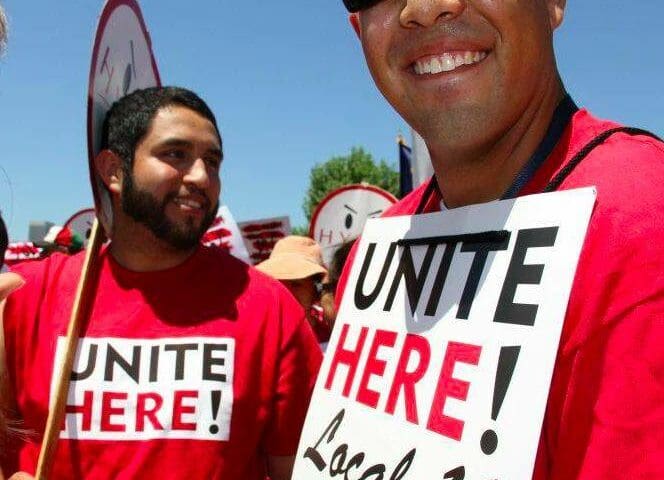

The agreement passed last night is a breakthrough in beginning to restore tax fairness and achieves some key goals of working families. It does not cut Social Security, Medicare or Medicaid benefits. It raises more than $700 billion over 10 years, including interest savings, by ending the Bush income tax cuts for families making more than $450,000 a year. And in recognition of the continuing jobs crisis, it extends unemployment benefits for a year. A strong message from voters and a relentless echo from grassroots activists over the last six weeks helped get us this far.
But lawmakers should have listened even better. The deal extends the Bush tax cuts for families earning between $250,000 and $450,000 a year and makes permanent Bush estate tax cuts exempting estates valued up to $5 million from any tax. These concessions amount to over $200 billion in additional tax cuts for the 2 percent.


Source: Zina Saunders on YouTube


We begin 2013 awaiting the House of Representatives vote on tax legislation passed by the Senate early this morning. So we’re technically off the fiscal cliff but not really about to hit the ground – yet. Below are some initial perceptions of what the legislation means, beginning with the conservative American Spectator.
» Read more about: Tax Deal: Over the Cliff or Tied to the Tracks? »


The New York Times should be embarrassed. On December 24 it gave a Christmas present to the corporate-backed lobby group Fix the Debt with its front-page Business section puff piece about the organization, which is pushing to balance the federal budget by slashing social programs while cutting taxes for the rich.
The 1149-word piece, “One Woman’s War on Debt Gains Steam,” by reporter Annie Lowrey, is a fawning profile of the group’s public face, Maya MacGuineas. The article makes it appear that the Fix the Debt group was hatched last year at a dinner party at Senator Mark Warner’s house, when in fact it is simply the latest incarnation of Pete Peterson, the billionaire Wall Street financier who over many years has invested tens of millions of his money in his long-term crusade to reduce the federal debt on the backs of the poor and middle class, including the Committee for a Responsible Federal Budget,
» Read more about: Capitol Shill: N.Y. Times Swallows Fake Expert's Act »


The Wall Street Journal (in a pay-walled feature) reported online last night that Walmart will begin to monitor conditions at warehouses operated by subcontractors.
The policy change represents a concession to employees at those facilities, who have claimed they are subjected to harsh and unsafe working conditions, along with unfair labor and wage practices. Locally, warehouses in the Inland Empire have been the target of strikes and other protests by workers.
WSJ reporter Shelly Banjo wrote:
“[T]he Bentonville, Ark., giant is developing an auditing system, similar to the one it uses to monitor overseas factories in places such as China and Bangladesh, to help ensure that the domestic parts of its supply chain are complying with safety and labor rules . . . State labor officials and activists called Walmart’s plan to monitor warehouses insufficient, saying that a fire at a Bangladesh garment factory that killed 112 workers last month underscored the shortcomings of such auditing systems.”
Although the warehouse workers are not currently represented by unions,
» Read more about: Walmart to Police Its Subcontracted Warehouses »


Federal Mediation and Conciliation Service Director George H. Cohen today announced the extension of contract talks between the East and Gulf Coast longshore union and shipping-industry management. The agreement, which apparently has resolved the thorny issue of container royalties, averts an International Longshoremen’s Association strike that had been scheduled to take place Sunday.
Cohen’s statement read:
“I am extremely pleased to announce that the parties have reached the agreements set forth below as a result of a mediation session conducted by myself and my colleague Scot Beckenbaugh, Deputy Director for Mediation Services, on Thursday, December 27, 2012:
“The container royalty payment issue has been agreed upon in principle by the parties, subject to achieving an overall collective bargaining agreement. The parties have further agreed to an additional extension of 30 days (i.e., until midnight, January 28, 2013) during which time the parties shall negotiate all remaining outstanding Master Agreement issues,
» Read more about: Breaking News: Port Pact Talks Extended »


While most eyes are focused on January 1 and that storied piece of geography known as the fiscal cliff, another crisis looms next week: A longshore workers strike that could shut down docks along the Eastern seaboard and Gulf of Mexico. The International Longshoremen’s Association hasn’t waged a full-fledged strike since 1977, but is now threatening to do so if a new collective bargaining agreement is not in place by December 30. The union’s contract with the U.S. Maritime Alliance expired September 30.
Writes the New York Times‘ Steven Greenhouse:
“The strike threat has so alarmed corporate America that more than 100 business groups wrote to President Obama last week to urge him to intervene to push the two sides to settle — and, if need be, to invoke his emergency powers under the 1947 Taft-Hartley Act to bar a strike.”
According to a statement released December 24 by the Federal Mediation and Conciliation Service,


1. Protecting Families from Foreclosures. This year, California became the first state to enact reforms that ban the practice of foreclosing on a family seeking a loan modification (AB278, SB900). These bills also increased penalties for “robo-signing,” or the filing of false mortgage documents, and required banks to create a single point of contact for those seeking a loan modification.
2. Winning improvements for injured workers. California’s injured workers have suffered under slashed benefits and delayed medical treatment under Schwarzenegger reforms. Comprehensive workers compensation reform enacted this year (1) increases benefits for injured workers system-wide by $860 million or 30 percent, (2) cuts down delays in medical treatment, and (3) stabilizes the insurance market by removing inefficiencies and excess profiteering from the system. SB 863 earned strong bipartisan support and was based on Labor-management negotiations.
3. Building the High Speed Rail. As with any bold project, the voices of doom and decline said the high speed rail couldn’t be built.
» Read more about: The Year's Top Five Legislative Victories for Workers »


Please refer the Union Hotel Guide to search for recommended union hotels. Make sure to steer clear of boycotted hotels and you may wish to consider the desirability of staying at hotels that are at risk of dispute (where there are current or looming labor disputes). Be aware that this list only reflects the present status of union hotels across North America. To avoid the prospect of labor conflict during your stay at a hotel, insist on protective contractual language when you make a reservation or organize an event.
Boycott These Properties In the Los Angeles/Orange County Area
Hyatt Hotels
For more information about the Global Boycott of Hyatt, please visit hyatthurts.org
Embassy Suites Irvine
2120 Main Street Irvine, CA 92614
LAX Hilton and Towers
5711 W. Century Blvd Los Angeles, CA
Holiday Inn LAX
9901 South La Cienega Boulevard Los Angeles,
» Read more about: Don't Ring in the New Year at Boycotted Hotels »


Speaker Boehner’s debacle in failing to get his own caucus to support his “Plan B” is not only his failure, it shows the complete disarray of the congressional Republican Party. They are simply incapable of a coherent response to a problem that calls upon them to go beyond campaign talking points.
This gives the President and Democrats in the House and Senate an opportunity to set fiscal cliff policy, in two stages. First, before the end of 2012, they should pass a bill in the Senate that would end the Bush tax cuts for those earning over $250,000 per year, as the President promised during the campaign. The bill should also extend unemployment coverage for the long-term unemployed, extend the debt limit for at least a year, and adjust the Alternative Minimum Tax to inflation. It should suspend (not cancel) the mandatory across-the-board spending cuts in the Fiscal Cliff law.
The 52-47 Democratic majority in the Senate is ample to pass the bill;


Source: The Electrical Worker/IBEW


One of the proposals floated for months in the fiscal bluff debate in Washington, D.C., is a change to the formula used to measure inflation for Social Security Cost-of-Living Adjustments (COLAs) called the “chained” CPI. Let’s be clear: This is a benefit cut. These COLAs make sure seniors’ income keeps pace with the rising costs of housing and food. The “chained” CPI would cut future Social Security benefits by as much as $2,432 for someone who is 17 years old today. Studies from the Center for Economic and Policy Research (CEPR) show that not only is the “chained” CPI a benefit cut, it eventually will lead to higher taxes for most working people.
For instance, CEPR estimated that the change to the “chained” CPI would lead to a cut in benefits of three percent after 10 years, six percent after 20 years and nine percent after 30 years.
» Read more about: Chained CPI: Proposed New COLA Leaves Bad Taste »


My name is Cathy Youngblood. I work as a housekeeper at the Hyatt Andaz in West Hollywood. There are many positive things about being a housekeeper. I get to meet the world. I have a real bond with the other women I work with. I also take pride in working in a field where I give comfort and pleasure to people when they travel.
There are also challenges to being a housekeeper. Every day the work is exhausting and physically debilitating. And management doesn’t always really listen when we have ideas about how to make the work safer or more efficient.
I care about my job, but also I see how things could be better. That’s why Hyatt needs someone like me on its board of directors. The current corporate officers might have business sense, but I have common sense. They push paper, I do the physical labor.
» Read more about: Hotel Worker Says: Put Me on Hyatt's Board! »


“And it came to pass in those days, that there went out a decree from Caesar Augustus, that all the world should be taxed.”
Those are the opening lines from the Christmas story according to St. Luke, as written down by the team of scholars working under the direction of King James of England 500 years ago. Different translators have used different phrases over the centuries, but the frame for telling this story has always been taxes.
The Roman Empire wanted to make sure everyone paid their taxes, so Rome required its subjects to return to their towns of birth to sign into the national registry as part of a census, which allowed the keepers of the treasury to know who had paid and who had not. And that’s how Jesus got to be born in Bethlehem.
In California, we face a different dilemma. For decades now,


(This article first appeared on Equal Voice News.)
Rosa Rivera worked in housekeeping at the Best Western Golden Sails Hotel in Long Beach, Calif., for 20 years. In all those years, she never received health benefits, a paid vacation or a paid sick day. She often cleaned 17 to 18 rooms a day.
When Rivera heard that Long Beach voters on Nov. 6 had resoundingly approved Measure N, requiring nonunion hotels with more than 100 rooms to pay its workers at least $13 an hour and provide five paid sick days a year, she was overjoyed.
With the new wage increase, Rivera’s weekly paycheck would jump from $320 a week to $520, before taxes. She dared to dream of what it would be like to have almost $2,000 a month to live on.
Rivera, 43, shares a one-bedroom apartment with her daughters and granddaughters.
» Read more about: Hotel Grinch Lays Off Workers as Living Wage Law Takes Effect »


(This post first appeared on Union Plus.)
No holiday tradition competes with the family meal. Between desserts decorated full of cheer and marvelous meats that melt in your mouth, ‘tis the season for a full stomach. Luckily for union members, members of the United Food and Commercial Workers (UFCW), the Bakery, Confectionery, Tobacco Workers and Grain Millers (BCTGM) and the United Farm Workers (UFW) have an amazing variety of ingredients such as Hershey’s chocolate and Montpelier Almonds to create the most delicious and view-licious recipes. Here are five fun holiday dessert recipes to help you be union, buy union and bake union.
Rolo Pretzel Delights (Thank the UFCW members for Rolo)
Ingredients: Small pretzels, ROLO Chewy Caramels in Milk Chocolate, Pecan halves
Directions:


(Note: This feature first appeared September 21, 2012.)
On September 14 the Web exploded with news that billionaire industrialists Charles and David Koch had donated $4 million in support of Proposition 32. A San Francisco Chronicle editorial noting the donation labeled the brothers “conservative ideologues” – a moniker often applied to the Kochs. This description, however, gives the Kochs far too much credit for their supposed philosophical purity—particularly as it relates to the Prop. 32 battle.
Despite their reputations as libertarian true believers, the Koch brothers are nothing if not practical businessmen, who have no trouble taking advantage of government subsidies when it bolsters their bottom line. (Koch Industries, for instance, was for years heavily invested in the $6 billion, federally subsidized ethanol industry.) That bottom line runs up and down the state of California, where Koch Industries has hundreds of millions of dollars invested through its subsidiary Georgia-Pacific—a gypsum,
» Read more about: Classic Koch: How Prop. 32 Could Enrich Two Billionaires »


President Obama must remember the message of election night and back away from cutting Social Security benefits.
That didn’t last nearly as long as I had hoped. I put on my Obama baseball cap – the one I picked up from a street vendor walking to the inauguration four years ago – a few weeks before the November election. I’ve worn it every day since, to both celebrate his victory and cheer on the president for keeping to a progressive promise in the fiscal negotiations. Part of that promise was telling the Des Moines Register that Social Security benefits should not be cut. But it looks like my cap is going back on the shelf if reports that Obama is willing to cut Social Security benefits prove to be true.
There are three things to keep in mind about the president agreeing to cuts in Social Security benefits.


As the economy slowly rebounds, we need to ask what kind of recovery we want in Los Angeles.
Experts point to tourism as a key industry poised to help drive recovery and growth in our region. The potential is certainly there. Tourism is the largest employer in Los Angeles, accounting for one in ten jobs. And hotels in particular have recovered past pre-recession levels, with projections for strong growth. Industry analysts PFK Hospitality Research forecast revenue per available room in Los Angeles to grow by an average of 5.6 percent per year over the next five years – on top of an 11.7 percent increase this year. (For comparison, the long-run average is 3.3 percent.)
However, jobs in hospitality and tourism come in very different shapes. Some of our large hotels succeed while paying good middle-class wages and benefits. Others offer only poverty jobs that leave workers struggling to support themselves,
» Read more about: The Economy Improves — Will the Minimum Wage? »


Every year I watch A Christmas Carol on TV to remind myself not to give in to the frustrations born of shopping, traffic and rushing from one holiday gathering to the next. Whether we are religious or not, the holiday season is an opportunity for all of us to be grateful for what we have and to share our good fortune and good will.
Oh yes, it’s a timely story, but I’ve also often taken comfort in the fact that it’s a story from a bygone era—19th century England, with all the horrors of the economic injustice characteristic of the pre-union Industrial Revolution. Thank God we’ve progressed to a better time than that!
Or have we? Imagine my surprise when I heard about the response of some Long Beach hotel owners to that city’s new living wage law for workers at the city’s largest hotels (100 rooms or more).